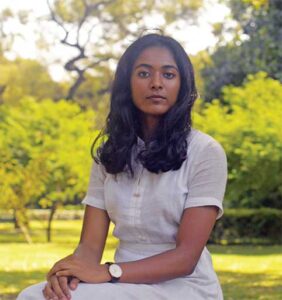 DEGREES: Interdisciplinary B.A. in international relations; M.Sc. in contemporary India, University of Oxford
DEGREES: Interdisciplinary B.A. in international relations; M.Sc. in contemporary India, University of Oxford
JOB TITLE: Agricultural value chain and carbon impact consultant, Food and Agriculture Organization (FAO) of the United Nations, in Accra, Ghana
FAVORITE TRINITY MEMORY: During the first week of my first year, a period during which social anxiety tends to run at an all-time high for most first-years, I was sitting on one of the pews in the Chapel, waiting for Matriculation to commence. I didn’t know anyone back then besides a high school friend of mine who also coincidently got into Trinity. There was an empty spot beside me, and I didn’t think anyone would sit there until a jovial looking girl came and sat next to me. We struck up a conversation back then, and it hasn’t stopped since. We have been best mates since then despite being in different continents, and this wouldn’t have happened if it were not for Trinity bringing us together.
What do you do in your role at the FAO? I focus on agriculture in Africa. I work with a carbon balance tool that essentially helps one measure the carbon impact and footprint of development projects and agricultural value chains. This tool enables one to assess whether certain proposed agricultural development practices in a project or value chain are creating further emissions reductions compared with what would have happened in the absence of it. The goal is to make agriculture more climate smart and sustainable by supporting evidence-based policy and development.
What path did you take to get this position? Getting here has definitely been a progressive journey for me, and it started at Trinity. In fact, some courses I took at Trinity nudged me toward thinking more about sustainability (Professor Brigitte Schulz’s “Politics of Developing Countries” and “International Political Economy”), and that inspired me to take an internship in energy security in India, and, with more research over time, spurred me to write my master’s thesis on climate policy in India. I am fortunate to say that I have found my life’s calling since then. My aim was and is to do everything I can to support the fight against the climate crisis, professionally and at a personal level, too. I placed a keen focus on pursuing a career in the climate field as soon as I could and interned at The Climate Group (London) and the International Fund for Agricultural Development (Rome) and then worked for a year at the Centre for Science and Environment (New Delhi)—all within the climate policy space—before coming here to FAO.
What do you enjoy most about your work? Working in a multicultural, diverse work environment among some of the leading agricultural and climate experts to address some of the most crucial and pressing global issues of our time.
What are the biggest challenges you face? It would be climate/eco-anxiety for me. Being in this field, I am exposed to news of environmental and climate disasters on the regular, making fighting climate change sometimes a bigger uphill battle mentally. Fighting climate change becomes hard when one is overwhelmed by a sense of doom and hopelessness despite the effort put in to address the issue. However, trying to interact and work with like-minded and driven people in this cause gives me a sense of balance during such trying times.
How did Trinity prepare you for the work you do? Academically, Trinity gave me the flexibility to find and eventually pursue my professional calling at a time when I was confused and clueless as to what career path to take. Through Trinity’s liberal arts format and some incredibly passionate professors who guided me through the process and sparked my interest in understanding the world’s most pressing issues, I was able to craft my way. Socially, Trinity exposed me to different cultures through its societies and student associations, namely the International House, the Caribbean Students’ Association, and the Trinity African Choir. Being able to enjoy and engage in such spaces inevitably enhanced my ability to adapt, interact, and work in multicultural environments, something that I have continued to tap into until this day. My passion for sustainability, ability to work in multicultural environments, and drive to create progress and impact (for myself and others), burgeoned at Trinity and was nurtured by the educational and social environment it had to offer. Were it not for that, I probably would not be where I am today.
What was the most memorable course you took at Trinity? I would [say] Professor Alejandro Jacky’s course on Hispanic films (a course I audited), where we spent most of the time watching Hispanic horror movies, analyzing and deconstructing in Spanish prominent themes that emerged from them, and spent the remaining time laughing at Professor Jacky’s quirky and often self-deprecating jokes. His unique and comical approach toward teaching Spanish made learning it not only entertaining but also easier to remember and speak—in its truest sense memorable.
